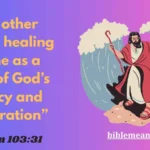In a world filled with challenges, worries, and uncertainties, many Christians find themselves wondering about the concept of atonement.
What does it truly mean, and why is it so significant to our faith? Understanding atonement is key to knowing God’s heart for humanity and His deep desire to reconcile us with Him.
This article will explore the biblical meaning of atonement, offering insights into its spiritual significance and how it applies to our daily lives.
Through this journey, we aim to find peace, healing, and a deeper understanding of God’s love and grace.
Biblical Background: The Heart of Atonement
Atonement, in its simplest form, refers to the reconciliation between God and humanity, especially through the sacrifice of Jesus Christ. The Bible speaks of atonement in both the Old and New Testaments, and its importance cannot be overstated. The need for atonement arises from the fall of humanity in the Garden of Eden when Adam and Eve’s disobedience introduced sin into the world (Genesis 3). Sin separates us from God, and atonement is the divine solution to bridge this gap.
In the Old Testament, atonement is closely linked to the sacrificial system. Leviticus 16 describes the Day of Atonement (Yom Kippur), when the high priest would offer sacrifices for the sins of the people. The blood of animals, such as goats and bulls, symbolized the covering of sin. These sacrifices, however, were only temporary, pointing to a greater sacrifice to come. The ultimate atonement was fulfilled through the life, death, and resurrection of Jesus Christ.
Key Bible Verses:
- Leviticus 17:11 – “For the life of a creature is in the blood, and I have given it to you to make atonement for yourselves on the altar; it is the blood that makes atonement for one’s life.”
- Romans 5:10 – “For if, while we were God’s enemies, we were reconciled to him through the death of his Son, how much more, having been reconciled, shall we be saved through his life!”
Spiritual Interpretations of Atonement
Atonement is more than a theological concept; it’s deeply personal and transformative. Below are some of the spiritual lessons and meanings that arise from a biblical understanding of atonement:
1. Restoration of Relationship with God
Atonement is God’s way of restoring our broken relationship with Him. Sin created a rift between humanity and God, but through atonement, this divide is healed.
- Bible Verse: 2 Corinthians 5:18 – “All this is from God, who reconciled us to himself through Christ and gave us the ministry of reconciliation.”
- Reflection: As modern Christians, we are called to embrace the reconciliation offered by Christ. Through Jesus, we can now draw near to God without fear or shame, enjoying His presence and peace. This restoration should fill our hearts with gratitude and encourage us to live in harmony with others.
2. Atonement as a Substitute for Sin
The concept of substitution is central to the doctrine of atonement. Jesus Christ became the substitute for our sins, taking on the punishment we deserve.
- Bible Verse: Isaiah 53:5 – “But he was pierced for our transgressions, he was crushed for our iniquities; the punishment that brought us peace was on him, and by his wounds we are healed.”
- Reflection: Jesus’ sacrifice on the cross is not just a historical event; it’s a personal act of love for each believer. The idea that He took our place and bore our sins is a powerful reminder of His immense love. As Christians, we are called to respond with a heart of gratitude and a life devoted to living out His love and grace.
3. Atonement as a Call to Holiness
Atonement also points to a life of holiness. When God reconciled us through Christ, He also calls us to live lives that reflect His holiness.
- Bible Verse: 1 Peter 1:15-16 – “But just as he who called you is holy, so be holy in all you do; for it is written: ‘Be holy, because I am holy.’”
- Reflection: Atonement not only restores our relationship with God but also empowers us to live righteous lives. It calls us to leave behind sin and pursue holiness in our actions, thoughts, and relationships. True gratitude for God’s sacrifice leads us to live in a way that honors Him.
4. The Gift of Peace Through Atonement
Atonement brings peace, not just in the sense of forgiveness, but also in the assurance that we are no longer enemies of God. This peace is foundational to the Christian life.
- Bible Verse: Ephesians 2:14-16 – “For he himself is our peace, who has made the two groups one and has destroyed the barrier, the dividing wall of hostility… his purpose was to create in himself one new humanity out of the two, thus making peace.”
- Reflection: Through the atonement, we are offered peace with God and, by extension, peace with others. This peace transcends understanding and is a vital aspect of the Christian journey. It’s a reminder that, no matter the trials we face, God’s peace reigns over our hearts and lives.
Examples or Variations of Atonement
While the central theme of atonement is God’s reconciliation with humanity, the Bible also explores how this reconciliation plays out in different contexts.
1. The Atonement for Personal Sin
Each individual’s sin requires atonement, which can be seen in the Old Testament sacrifices and the personal invitation to accept Christ’s atoning work.
- Bible Verse: 1 John 1:9 – “If we confess our sins, he is faithful and just and will forgive us our sins and purify us from all unrighteousness.”
2. Corporate Atonement
The Bible also speaks about collective atonement, where communities or nations seek God’s forgiveness. This can be seen in the Day of Atonement and in prayers for national repentance.
- Bible Verse: 2 Chronicles 7:14 – “If my people, who are called by my name, will humble themselves and pray and seek my face and turn from their wicked ways, then I will hear from heaven, and I will forgive their sin and will heal their land.”
Dealing with Negative Signs or Troubling Dreams
In some instances, the topic of atonement may arise during periods of spiritual turmoil or distress, such as troubling dreams or feelings of separation from God. If you find yourself struggling with negative signs, it’s important to seek spiritual guidance and trust in God’s protective power.
- Protective Prayers: You can pray Psalm 91 for protection and Ephesians 6:10-18 for the armor of God, which shields you from any spiritual harm.
- Prayer for Protection: “Lord, protect me from evil and cleanse my mind from any harmful thoughts or dreams. Help me to rest in Your peace and find strength in Your love.”
- Self-Examination and Repentance: Take time to reflect on areas where sin may have created distance between you and God. Repentance is an important step toward spiritual healing.
- Seeking Spiritual Help: If the troubling signs persist, seek counsel from trusted spiritual leaders who can offer guidance and prayer support.
Faith Based Guidance: Steps to Peace
If you are struggling to understand or experience atonement fully, here are some steps to take:
- Embrace Prayer: Continually pray for God’s peace and understanding of His atoning work through Jesus Christ.
- Practice Self-Examination: Regularly examine your heart and actions, asking God to reveal areas where you need to change.
- Seek Spiritual Mentorship: Don’t walk this journey alone. Talk to a pastor or a spiritual mentor who can help you understand and apply the concept of atonement in your life.
Conclusion:
In conclusion, the biblical doctrine of atonement is not just a theological concept; it is a life-transforming truth.
It represents God’s deep love for humanity, His desire for reconciliation, and His provision of peace through Jesus Christ.
As Christians, understanding atonement should fill us with gratitude, empower us to live in holiness, and deepen our relationship with God.
Trust in His plan, embrace His peace, and remember that through Christ, you are reconciled to the Father forever.











